卢梭《一个孤独漫步者的遐想》 Third Walk (Reveries of the Solitary Walker) by Jean-Jacques Rousseau
《一个孤独漫步者的遐想》读书笔记
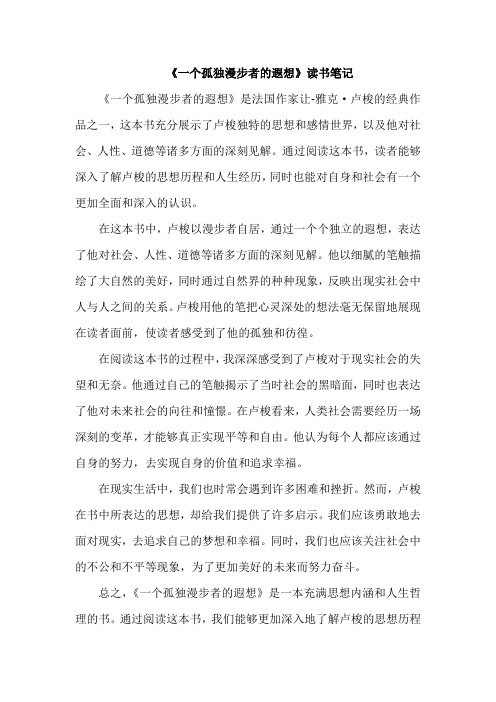
《一个孤独漫步者的遐想》读书笔记
《一个孤独漫步者的遐想》是法国作家让-雅克·卢梭的经典作品之一,这本书充分展示了卢梭独特的思想和感情世界,以及他对社会、人性、道德等诸多方面的深刻见解。
通过阅读这本书,读者能够深入了解卢梭的思想历程和人生经历,同时也能对自身和社会有一个更加全面和深入的认识。
在这本书中,卢梭以漫步者自居,通过一个个独立的遐想,表达了他对社会、人性、道德等诸多方面的深刻见解。
他以细腻的笔触描绘了大自然的美好,同时通过自然界的种种现象,反映出现实社会中人与人之间的关系。
卢梭用他的笔把心灵深处的想法毫无保留地展现在读者面前,使读者感受到了他的孤独和彷徨。
在阅读这本书的过程中,我深深感受到了卢梭对于现实社会的失望和无奈。
他通过自己的笔触揭示了当时社会的黑暗面,同时也表达了他对未来社会的向往和憧憬。
在卢梭看来,人类社会需要经历一场深刻的变革,才能够真正实现平等和自由。
他认为每个人都应该通过自身的努力,去实现自身的价值和追求幸福。
在现实生活中,我们也时常会遇到许多困难和挫折。
然而,卢梭在书中所表达的思想,却给我们提供了许多启示。
我们应该勇敢地去面对现实,去追求自己的梦想和幸福。
同时,我们也应该关注社会中的不公和不平等现象,为了更加美好的未来而努力奋斗。
总之,《一个孤独漫步者的遐想》是一本充满思想内涵和人生哲理的书。
通过阅读这本书,我们能够更加深入地了解卢梭的思想历程
和人生经历,同时也能够对自己和社会有一个更加全面和深刻的认识。
希望每个读者都能够从中汲取到深刻的启示,为自己的成长和发展奠定坚实的基础。
孤独漫步_卢梭_一个孤独的散步者的遐想_
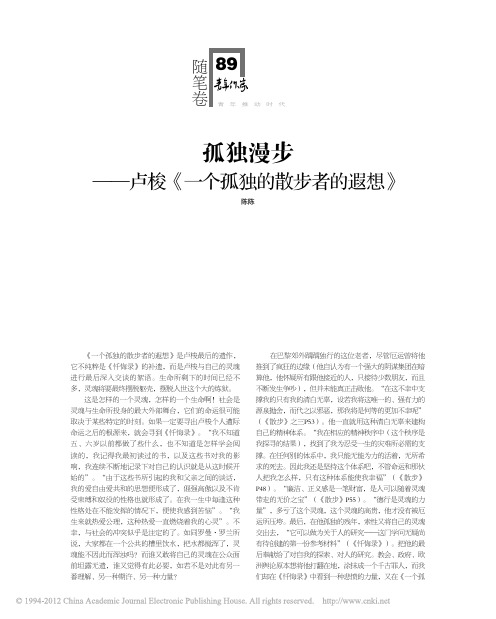
孤独漫步——卢梭《一个孤独的散步者的遐想》陈陈 《一个孤独的散步者的遐想》是卢梭最后的遗作,它不纯粹是《忏悔录》的补遗,而是卢梭与自己的灵魂进行最后深入交谈的絮语。
生命所剩下的时间已经不多,灵魂将要最终摆脱躯壳,摆脱人世这个大的炼狱。
这是怎样的一个灵魂,怎样的一个生命啊!社会是灵魂与生命所投身的最大外部舞台,它们的命运很可能取决于某些特定的时刻。
如果一定要寻出卢梭个人遭际命运之后的根源来,就会寻到《忏悔录》。
“我不知道五、六岁以前都做了些什么,也不知道是怎样学会阅读的,我记得我最初读过的书,以及这些书对我的影响,我连续不断地记录下对自己的认识就是从这时候开始的”。
“由于这些书所引起的我和父亲之间的谈话,我的爱自由爱共和的思想便形成了,倔强高傲以及不肯受束缚和奴役的性格也就形成了。
在我一生中每逢这种性格处在不能发挥的情况下,便使我感到苦恼”。
“我生来就热爱公理,这种热爱一直燃烧着我的心灵”。
不幸,与社会的冲突似乎是注定的了。
如同罗曼·罗兰所说,大家都在一个公共的槽里饮水,把水都搅浑了,灵魂能不因此而浑浊吗?而谁又敢将自己的灵魂在公众面前坦露无遗,谁又觉得有此必要,如若不是对此有另一番理解、另一种期许、另一种力量? 在巴黎郊外踽踽独行的这位老者,尽管厄运曾将他推到了疯狂的边缘(他自认为有一个强大的阴谋集团在暗算他,他怀疑所有跟他接近的人,只接待少数朋友,而且不断发生争吵),但并未能真正击败他。
“在这不幸中支撑我的只有我的清白无辜,设若我将这唯一的、强有力的源泉抛舍,而代之以邪恶,那我将是何等的更加不幸呢”(《散步》之三P53)。
他一直就用这种清白无辜来建构自己的精神体系。
“我在相应的精神秩序中(这个秩序是我探寻的结果),找到了我为忍受一生的灾难所必需的支撑。
在任何别的体系中,我只能无能为力的活着,无所希求的死去。
因此我还是坚持这个体系吧,不管命运和那伙人把我怎么样,只有这种体系能使我幸福”(《散步》P48)。
一个孤独漫步者的遐想

独语散文
《一个孤独漫步者的遐想》是标准的“独语”散文。“独语”散文从某种意义上说就是意识流散文,是比意 识流小说更为真实的创作主体的心灵档案。为了将“无声的心声”化为有声有形有色的心灵图景,“独语”散文 通常综合运用内心独白、内心分析和感官印象等意识流手法,有时也会单独使用其中某种手法。“独语”散文是 孤独者进行自我情感调节的一种文学治疗工具,它能够起到缓解意志与理性之间的冲突和张力,消除内心紧张焦 虑,返归宁静和平心境的特殊心理治疗功能。在卢梭的《一个孤独漫步者的遐想》中,我们可以看到,在“独语” 散文中,创作主体只与自我对话,“我”是倾诉者,“我”也是倾听者,“我”是一个自足的世界,语境呈现内 敛状态,语言上具有封闭性和自我指涉性。“独语”散文是孤独者对以感情为链的意识流的展示。卢梭在“漫步 之一”中写道:“这些文字实际上只是某种不成形的遐想日记,大多是在谈论有关我自己的问题,一个孤独的沉 思者总是考虑自己更多些。另外所有那些在我散步时闪过我脑海的怪念头也将在这本日记里占有一席之地。我想 到过什么也就说些什么,都是自然流露,少有那种前因后果的。
卢梭借这十篇遐想, “继续先前称为`忏悔’的这一严肃而诚恳的自省”。
作品赏析
作品主题
艺术特色
卢梭从 1776年开始尝试一种自足性质的写作,这就是通常被看作《忏悔录》续篇的《一个孤独漫步者的遐 想》。可以说,在《一个孤独漫步者的遐想》中,卢梭提供了另外一种生活,它专属于像卢梭一样的人,这种生 活“通过从公民社会中退隐、亦即生活在其边缘而得享至高无上的幸福。”《一个孤独漫步者的遐想》像一个身 心平静的人在畅谈自己的自由与幸福。通过“退隐”和“孤独的遐思”,卢梭以及像他那样的人获得了自由。在 第十个遐想尚未写完的时候,卢梭凄然离世,《遐想》成为卢梭孤独生命之旅的凄美绝唱。这部作品的艺术成就 获得了世界的公认。
《一个孤独漫步者的遐想》读后感
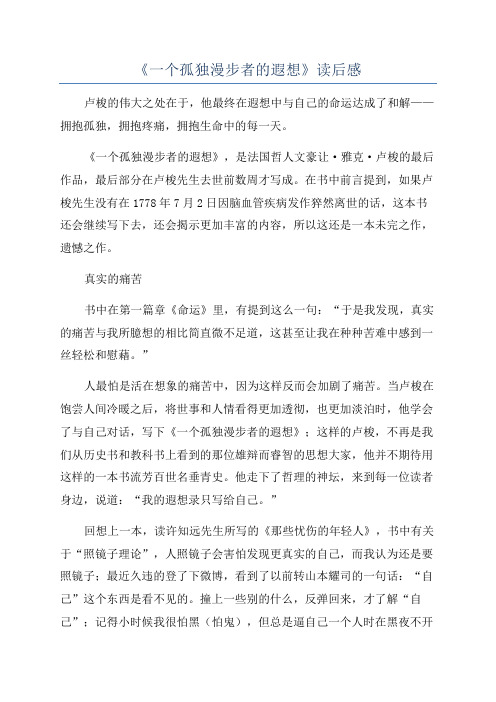
《一个孤独漫步者的遐想》读后感卢梭的伟大之处在于,他最终在遐想中与自己的命运达成了和解——拥抱孤独,拥抱疼痛,拥抱生命中的每一天。
《一个孤独漫步者的遐想》,是法国哲人文豪让·雅克·卢梭的最后作品,最后部分在卢梭先生去世前数周才写成。
在书中前言提到,如果卢梭先生没有在1778年7月2日因脑血管疾病发作猝然离世的话,这本书还会继续写下去,还会揭示更加丰富的内容,所以这还是一本未完之作,遗憾之作。
真实的痛苦书中在第一篇章《命运》里,有提到这么一句:“于是我发现,真实的痛苦与我所臆想的相比简直微不足道,这甚至让我在种种苦难中感到一丝轻松和慰藉。
”人最怕是活在想象的痛苦中,因为这样反而会加剧了痛苦。
当卢梭在饱尝人间冷暖之后,将世事和人情看得更加透彻,也更加淡泊时,他学会了与自己对话,写下《一个孤独漫步者的遐想》;这样的卢梭,不再是我们从历史书和教科书上看到的那位雄辩而睿智的思想大家,他并不期待用这样的一本书流芳百世名垂青史。
他走下了哲理的神坛,来到每一位读者身边,说道:“我的遐想录只写给自己。
”回想上一本,读许知远先生所写的《那些忧伤的年轻人》,书中有关于“照镜子理论”,人照镜子会害怕发现更真实的自己,而我认为还是要照镜子;最近久违的登了下微博,看到了以前转山本耀司的一句话:“自己”这个东西是看不见的。
撞上一些别的什么,反弹回来,才了解“自己”;记得小时候我很怕黑(怕鬼),但总是逼自己一个人时在黑夜不开灯行走,因为我知道一生里不可能不遇到黑夜的;其实“镜子”、“撞上的什么”、“黑夜”,这些就是真实的痛苦,它们在我们自己的想象里,被懦弱渲染得如一只不可战胜的魔怪,但当我们硬着头皮走上去时,会发现不过如此。
我上一年读到了一句很喜欢的话:“如果运气不好,那就试试勇气吧。
”我们曾经年轻勇敢,一往无前书中第九篇章《幸福》里提到:“而从我的处境和年龄来看,我都无法再与孩子们尽情分享玩闹的快乐了。
”——读到这句时,我不由升起了忧伤,有些快乐再也回不去了。
卢梭《孤独散步者的遐思》(下)

卢梭《孤独散步者的遐思》(下)卢梭《孤独散步者的遐思》(下)【第六章】关于文明社会的遐思论做善事只要我们善于探寻,总可以在我们内心找出任何做出不自觉动作的原因。
昨天,我打算去冉第耶附近的比爱夫河岸采集植物,当我经过新林荫道,快到“地狱之门”1时,我闪身向右转弯,从田野绕过去,经过枫丹白露大道,踏上那条小河的高地。
本来,这个绕行并无所谓,当我想起的时候,我便思考,到底我这么多次的无故绕行是为了什么?当我恍然大悟时,不禁失声大笑起来。
1.旧时巴黎的一个城门,在今孟巴那斯公墓以北。
夏天,在“地狱之门”外面林荫道的一个拐角,每天都有一个妇女在那儿摆摊,卖水果、药茶和面包。
她有一个跛脚的小男孩,非常可爱。
他总是拄着两条拐杖,瘸瘸拐拐走到路人面前乞讨。
我跟这小家伙曾见过面,每次从那路过,他总记得过来向我致意,我也总会给他一点施舍。
之初,我见到他时还很高兴,并非常乐意做此善举。
我坚持了一段时间.也总觉得这样做很有乐趣,有时会逗他两句,并觉得很开心。
可是,我马上头痛地感到,这种乐趣竟渐渐形成了一种习惯,并转变成了一种义务。
尤其是,每次我都得听他那些准备好的多余的废话,为了表示与我十分熟悉,总是叫我卢梭先生。
可是,他这样恰恰相反地告诉我,他并不比教他这么做的人更熟悉我。
打那以后,我便不由自主地绕道而行,很少再从那里经过。
这个事实是在我对那次绕道进行思考后才发现的。
因为,在此之前,我从未仔细地思考过这些。
这个发现.使我想起了很多其他的事情。
从这一发现可以肯定:我并不像我以前认为的那样对自己的大多数行为的真正的原始动机都很清楚。
我明白,也感觉到,人心能体会到的最真实的幸福就是行善。
但是,很久以来,我已经没有了享受这种幸福的权利。
在我坎坷的命运里,还能指望自由地选择.有效地做一件真正的善举吗?那些左右我命运的人最关心的是:让一切我能看到的事物都蒙上虚假的、骗人的假象。
我现在明白了,任何行善的动机都是别人丢给我的诱饵,以引诱我掉进不可脱身的陷阱。
一个孤独漫步者的遐想

目录分析
导读 一命运
二意外 三知识
四谎言与真相 五岛上的日子
六善行 七植物
八苦难 九幸福
十华伦夫人 卢梭生平大事年表
作者介绍
卢梭(Jean-Jacques Rousseau,1712年6月28日-1778年7月2日),出生于日内瓦,法国伟大的哲学家、 教育家、思想家、文学家,18世纪法国大革命的思想先驱,启蒙运动的代表人物之一。 1722年,寄宿在郎拜尔 西埃牧师家,学习古典语文、绘图、数学。1732年,做土地测量工作,自学数学。1737年,因化学实验双眼受伤, 到沙尔麦特村养病。1742年,在巴黎科学院提出《新乐谱记谱法》。1743年,写成歌剧《风雅的缪斯》,以教音 乐、抄乐谱为生。1749年,撰写《百科全书》的音乐部分。1750年,因应征论文《论科学与艺术》获第戎学院奖 金,而声名鹊起。1778年7月2日,在巴黎逝世。卢梭一生颠沛流离,因发表《科学与艺术的进步是否有助敦化风 俗》而闻名,主要著作有《社会契约论》《论人类不平等的起源和基础》等。
精彩摘录
真正的幸福之源就是我们自身,如果一个人懂得如何感受幸福,那么旁人便无法真正使之陷入悲惨境地。
在我草木皆兵的想象中,种种未来的苦难纠缠在一起,盘根错节,不断被放大,不断地增长。对我而言,等 待痛苦来临比痛苦本身残忍千百倍,被枪口对准胸膛对我而言远比枪击本身可怕得多。灾厄一朝临头,事实便失 去了想象的空间,只留下原本的内容。于是我发现,真实的痛苦与我所臆想的相比简直微不足道,这甚至让我在 种种苦难中感到一丝轻松和慰藉。
一个孤独漫步者的遐想
读书笔记模板
01 思维导图
03 读书笔记 05 目录分析
《孤独漫步者的遐想》

《孤独漫步者的遐想》作者:来源:《作文评点报·作文素材初中版》2016年第43期名著概览《孤独漫步者的遐想》是法国18世纪伟大的启蒙思想家、教育家、哲学家、文学家——让-雅克·卢梭临终前的最后一部作品,也是他留传后世的一部最富特色的不朽之作,是法国文学史上最优秀的散文作品之一。
作为法国大革命的思想先驱,卢梭学识渊博,多才多艺,其创作横跨哲学、文学、教育、政治、社会诸多学科,代表作品有《社会契约论》《爱弥儿》《忏悔录》等。
卢梭的一生颠沛流离,饱受磨难,倍感孤独,其原因一是他的代表作之一《爱弥儿》被当局列为大逆不道的禁书;二是伏尔泰在一篇文章中揭露他抛弃亲生子女的事实,要求对他处以极刑。
为了在世人面前还自己一个清白,他写了《忏悔录》,但仍然遭到种种非议和侮辱。
晚年,他重温往日的时光,审视自己的一生,在生命最后的日子里,在“再没有兄弟、邻里、朋友,再没有任何人际往来”的悲凄境况下,坦然展露自己的思想和感情,终于写出了《孤独漫步者的遐想》,再次为自己辩白。
遗憾的是他只写了十篇“漫步”就与世长辞了,没有给我们留下他完整的“遐想”。
《孤独漫步者的遐想》不仅是身体的“漫步”、心灵的“漫步”,更是一次文学的“漫步”,它迸发出的智慧的光芒,照亮了无数个卑污的灵魂。
人物小传卢梭(1712-1778年),在他生命诞生之时,就使他的母亲付出了生命的代价,而他自己也是奄奄一息。
多亏聪明能干的姑姑精心调治,才把他从死亡中解救出来,并抚养长大。
卢梭稍稍懂事后,便从父亲那丧偶的悲痛中感受到父母亲的深情。
父亲觉得在卢梭的身上可以重新看到自己妻子的音容笑貌,同时也不能忘记是卢梭害得他失去了妻子。
每当父亲拥抱卢梭时,在他那痉挛和叹息中总能感觉到他的抚爱里夹杂着一种辛酸的遗恨;惟其如此,他的抚爱就更为深挚。
父亲说:“让-雅克,我们谈谈你妈妈吧!”卢梭便说:“好吧,爸爸,我们又要哭一场了。
”父亲随即会泪流满面,哽咽着说:“唉!你把她还给我吧!安慰安慰我,让我能够减轻失掉她的痛苦吧!你把她在我心里留下的空虚填补上吧!孩子,若不是因为你是你那死去的妈妈生的孩子,我能这样疼你吗?”直到母亲逝世四十年后,父亲死在第二任妻子怀抱里时,嘴里却始终叫着前妻的名字,心里仍留着前妻的形象。
孤独漫步——卢梭《一个孤独的散步者的遐想》

孤独漫步——卢梭《一个孤独的散步者的遐想》
陈陈
【期刊名称】《青年作家》
【年(卷),期】2009(000)004
【摘要】@@ <一个孤独的散步者的遐想>是卢梭最后的遗作,它不纯粹是<忏悔录>的补遗,而是卢梭与自己的灵魂进行最后深入交谈的絮语.生命所剩下的时间已经不多,灵魂将要最终摆脱躯壳,摆脱人世这个大的炼狱.
【总页数】2页(P89-90)
【作者】陈陈
【作者单位】(Missing)
【正文语种】中文
【相关文献】
1.超脱与执着哲理与情思——论卢梭《一个孤独的散步者的遐想》 [J], 伍厚恺
2.自由和自由的困境——由《孤独漫步者的遐想》透视卢梭 [J], 刘子旻;
3.袁宏道,一个孤独的漫步者?——《满井游记》解读质疑 [J], 董红红
4.重拾孤独者的梦——读《一个孤独的散步者的梦》有感 [J], 焦浩然
5.“自我实现”的孤独者——读卢梭《一个孤独的散步者的遐想》 [J], 喻大翔因版权原因,仅展示原文概要,查看原文内容请购买。
卢梭——一个孤独的散步者的梦
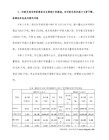
而是圆满的我在圣皮埃尔岛上就经常处于这种状态
我或者躺在随风飘荡的船中
或者坐在波涛汹涌的湖边
或者站在一条美丽的小河旁
或流水冲击砺石湍湍作响的溪边
孤独一人,静静沉思
卢梭 —— 一个孤独的散步者的梦
如果世间真有这么一种状态
心灵十分充实和宁静
既不怀恋过去也不奢望未来
放任光阴的流逝而仅仅掌握现在
不论他持续的长短都不留下前后接续的痕迹
无匮乏之感也无享受之感
不快乐也不忧愁,既无所求也无所惧
而只感受到自己的存在
处于这种状态的人就可以说自己得到了幸福
卢梭:一个孤独的散步者的遐想为题作文

卢梭:一个孤独的散步者的遐想为题作文卢梭:一个孤独的散步者的遐想众所周知,卢梭是一位出色的哲学家,政治家和作家,他留下了许多重要的著作和思想。
然而,在这个敏捷的时代里,我们却忽略了卢梭的身份作为一个孤独的散步者。
在本篇文章中,我将从一个不同的角度,通过探讨卢梭如何通过散步来思考,来阐述我对这位哲学家的理解。
在卢梭的著作《社会契约论》中,他提出了现代社会的自由与法律的关系,认为个人需要自我检查来保持良好的心态。
卢梭喜欢独自散步,以此来思考和梳理自己的思维。
因为散步可以让人的思想得到释放和放松,进而远离压力和烦扰,保持良好的心态。
卢梭的这种思维方式非常有特点,他对于事情的处理也往往有自己的想法。
在《论人类不平等的起源和基础》中,卢梭认为人类的不平等是由财富和社会地位造成的,他希望通过合理的社会制度来消除不平等。
这种思想遭到了当时社会支配者的反对,但卢梭不断地坚持自己的想法,最终将这个问题作为一个永恒的主题在哲学中流传。
卢梭的思想不仅表现在他的著作中,也表现在他的生活中。
卢梭特别喜欢在大自然中散步,他认为这样可以让自己与自然产生更好的联系,弥补人类在城镇生活中失去的自然本质。
这也影响到了他对社会生活的看法。
卢梭深信散步是获得灵感和智慧的最佳途径之一。
他认为,当人们漫步在大自然中时,会得到更多的思考和发现。
在寻找灵感的过程中,个人应该注意细节和感知。
例如,观察花卉,树木,清晨的光线等等,这些都可以启发人类得到更多的创意。
同时,散步过程中也可以促进身体的运动,达到健康的效果。
总之,卢梭是一个非常有思想的人,他的散步方式很有特点。
通过散步,他寻找灵感,思考将现代社会自由与法律相结合的方法,消除不平等,维护健康的生活方式,这些都值得我们学习。
我们每个人都应该学会用不同的方式来思考问题,尤其是在我们的社会中,灵感和创新变得与日俱增。
我们应该像卢梭一样,尝试通过散步和接触大自然来思考和发现自己的想法,这是一个非常值得鼓励的行为。
《读《一个孤独漫步者的遐想》有感》
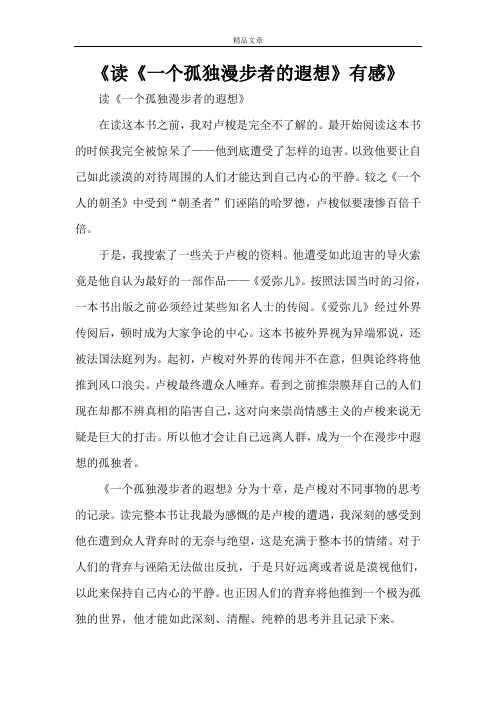
《读《一个孤独漫步者的遐想》有感》读《一个孤独漫步者的遐想》在读这本书之前,我对卢梭是完全不了解的。
最开始阅读这本书的时候我完全被惊呆了——他到底遭受了怎样的迫害。
以致他要让自己如此淡漠的对待周围的人们才能达到自己内心的平静。
较之《一个人的朝圣》中受到“朝圣者”们诬陷的哈罗德,卢梭似要凄惨百倍千倍。
于是,我搜索了一些关于卢梭的资料。
他遭受如此迫害的导火索竟是他自认为最好的一部作品——《爱弥儿》。
按照法国当时的习俗,一本书出版之前必须经过某些知名人士的传阅。
《爱弥儿》经过外界传阅后,顿时成为大家争论的中心。
这本书被外界视为异端邪说,还被法国法庭列为。
起初,卢梭对外界的传闻并不在意,但舆论终将他推到风口浪尖。
卢梭最终遭众人唾弃。
看到之前推崇膜拜自己的人们现在却都不辨真相的陷害自己,这对向来崇尚情感主义的卢梭来说无疑是巨大的打击。
所以他才会让自己远离人群,成为一个在漫步中遐想的孤独者。
《一个孤独漫步者的遐想》分为十章,是卢梭对不同事物的思考的记录。
读完整本书让我最为感慨的是卢梭的遭遇,我深刻的感受到他在遭到众人背弃时的无奈与绝望,这是充满于整本书的情绪。
对于人们的背弃与诬陷无法做出反抗,于是只好远离或者说是漠视他们,以此来保持自己内心的平静。
也正因人们的背弃将他推到一个极为孤独的世界,他才能如此深刻、清醒、纯粹的思考并且记录下来。
其中他谈论了自己对真诚与撒谎的认识。
他说:“为一己私利撒谎,那是诈骗;为他人之利而撒谎,那是舞弊;为了害人而撒谎,那是诽谤。
这三类是恶劣的‘撒谎’。
但如果“说假话”不为了谁的利益,不为了偏向谁,那就算不上撒谎,只能说是虚构。
”对于真诚与撒谎,我从未深刻的思考过,他对“撒谎”做出的定义也是我不曾遇到的。
在我看来真诚便是待人接物都付出自己真实的感情。
而对于撒谎——在我们的生活中,撒点小谎似乎是再正常不过的事。
卢梭却对自己的一生要求严格,他厌恶撒谎,他可以毫不心虚的对人说:我的一生只撒过两个谎。
一个孤独漫步者的遐想

——被驱逐的人——卢梭与公众之间——《遐想集》的构思如今,我在世上落得孤零零—个人了。
除了我自己,再没有兄弟、邻人、朋友、社会。
一个最好交谊、最重感情的人,已被同心协力地驱除出人类。
他们在仇恨的百般发泄中寻觅,哪一种折磨对我这颗敏感的心是最残酷的。
于是,他们便把维系着我与他们的一切联系粗暴地破坏掉了。
我本是爱那些人的,不计较他们怎样对待我。
他们也只有在不再成其为人的时候,才得以逃避我的爱。
因此,对于我,他们都成了局外人,陌生人,最终不存在了,反正他们早就巴不得哩。
我自己呢?脱离了他们,脱离了一切,我究竟是个什么样子呢?这正是我有待于研究的。
不幸的是,在作这个研究之前,我必须首先对我的处境作一番回顾,这是一条必经的思路,通过它,我才能由他们论及我。
十五年多以来(准确地说,应该是十四年以来,可追溯到1762年,《爱弥尔》被焚烧、他与皮埃奈夫人、格里姆、狄德罗大闹不和的那个时期。
),我就一直处于这种离奇古怪的境地中。
我至今仍觉得这是一场恶梦。
我总在幻觉:消化不良折磨着我,我睡不安席,一合上眼很快又会醒来的,但是,在与旧友的重逢中,我的痛苦也会大大减轻。
我准是于不知不觉中完成了一个跳跃:一个由清醒到昏睡,抑或更确切地说,由生到死的跳跃。
我不知怎么越出了事物的正常秩序,兀然堕入莫名其妙的混沌中。
在这一片混沌中,我什么也看不见,我越是琢磨我眼下所处的位置,我就越不能明白我身置何处。
唉!当初,我哪里能够预见这个静候着我的命运呢? 今天,我落得如此命运,我还哪里能够预先把它设想? 凭我的良知,我当初能够预料到,有朝一日,我这样一个人(我过去是,现在仍是这样—中人) 竟会变成或竟会被人无可置疑地当作怪物、放毒犯、杀人凶手吗? 我能够料想到,我竟会为人类所不齿,为恶棍仍所捉弄吗? 我能够料想到,路人所能向我表示的全部敬意,居然是往我身上吐唾沫,当今一代竟会一个心眼地恨不得将我活埋才痛快吗? 在这奇异的变故发生之初,我毫无准备,所以甚为震惊。
卢梭:我看清了人类布下的所有陷阱,却不能避开其中任何一个
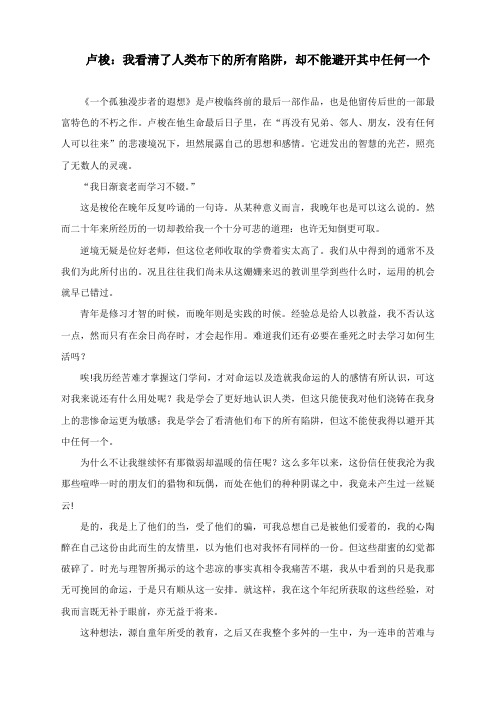
卢梭:我看清了人类布下的所有陷阱,却不能避开其中任何一个《一个孤独漫步者的遐想》是卢梭临终前的最后一部作品,也是他留传后世的一部最富特色的不朽之作。
卢梭在他生命最后日子里,在“再没有兄弟、邻人、朋友,没有任何人可以往来”的悲凄境况下,坦然展露自己的思想和感情。
它迸发出的智慧的光芒,照亮了无数人的灵魂。
“我日渐衰老而学习不辍。
”这是梭伦在晚年反复吟诵的一句诗。
从某种意义而言,我晚年也是可以这么说的。
然而二十年来所经历的一切却教给我一个十分可悲的道理:也许无知倒更可取。
逆境无疑是位好老师,但这位老师收取的学费着实太高了。
我们从中得到的通常不及我们为此所付出的。
况且往往我们尚未从这姗姗来迟的教训里学到些什么时,运用的机会就早已错过。
青年是修习才智的时候,而晚年则是实践的时候。
经验总是给人以教益,我不否认这一点,然而只有在余日尚存时,才会起作用。
难道我们还有必要在垂死之时去学习如何生活吗?唉!我历经苦难才掌握这门学问,才对命运以及造就我命运的人的感情有所认识,可这对我来说还有什么用处呢?我是学会了更好地认识人类,但这只能使我对他们浇铸在我身上的悲惨命运更为敏感;我是学会了看清他们布下的所有陷阱,但这不能使我得以避开其中任何一个。
为什么不让我继续怀有那微弱却温暖的信任呢?这么多年以来,这份信任使我沦为我那些喧哗一时的朋友们的猎物和玩偶,而处在他们的种种阴谋之中,我竟未产生过一丝疑云!是的,我是上了他们的当,受了他们的骗,可我总想自己是被他们爱着的,我的心陶醉在自己这份由此而生的友情里,以为他们也对我怀有同样的一份。
但这些甜蜜的幻觉都破碎了。
时光与理智所揭示的这个悲凉的事实真相令我痛苦不堪,我从中看到的只是我那无可挽回的命运,于是只有顺从这一安排。
就这样,我在这个年纪所获取的这些经验,对我而言既无补于眼前,亦无益于将来。
这种想法,源自童年所受的教育,之后又在我整个多舛的一生中,为一连串的苦难与不幸所增强,这就使得我把全部的时间都用来研究我自身的天性与用途,并且以任何人都未曾有过的兴味与仔细。
孤独的漫步者的遐思读后感

孤独的漫步者的遐思读后感经朋友推荐,近日,我阅读了《一个孤独漫步者的遐想》一书。
这本书是伟大的法国启蒙思想家、哲学家、教育家、文学家让—-雅克·卢梭先生的临终遗作,是他在生命的最后日子里,对自己的剖白与总结。
说真的,在这之前我对卢梭并不了解。
之所以喜欢阅读这本书,开始是因为被这本书的名字吸引住了。
因为我喜欢“孤独”,所以先是“孤独”两个字,触及到了我的灵魂,再就是被题目里的“漫步”和“遐想”两个词深深抓住了眼球。
整个题目充满了浪漫和诗意,瞬间给人一种:一个孤独者在海边或沙漠里漫步的画面。
书名的本身就是一声美丽的嗟叹,就如作者的晚年,或者一生。
打开书页认真阅读,很快就被作者所讲述的内容和思想观点吸引,也渐渐被卢梭先生的宁静带入。
于是,便开始了与卢梭先生一起漫步遐想。
冬末的阳光,透过玻璃温柔的洒在书页上,我一行行的认真读下去,心灵也渐渐进入宁空的状态。
卢梭先生曾说过:他对孤独生活抱有强烈的兴味,甚而再也不想离开这种生活。
所以在生命的最后阶段也不曾放弃这种孤独的旅程。
卢梭的心是敞开的,他用自己善良的灵魂,孤独地承受着正直与善良的压迫。
他感受着这份孤独的快乐。
面对所有的恶意中伤,他在无奈中成了出气筒,并且在反思中无奈的接受这份孤独。
善良是每个人都有的。
但不是每个人都愿意对所有人都善良。
卢梭曾经说过:“虽然我很柔弱,我的心既傲慢又温柔,然而我是不可战胜的。
”所以他一直给我一种很温柔睿智且孤傲的感觉,就像他在这本书里说到的那样“那么一翻开这些记录,我便会想起当初下笔书写时的美好,让已经流逝的时光重现。
这样一来,可以说我的生命增加了一倍。
不管人们如何对待我,我都将再次体会到交际的魅力,衰老的我将和另一个时代的我相逢,仿佛和一位忘年交的老友重逢。
”这也让我明白了,我也是很喜欢把今天的想法写下来,过一段时间再看时,是何其的美好。
作者在书中还写到:我越来越需要一种新的追求,异于以往的不真实的虚荣。
这种虚荣好像一团雾气,刚刚飘过来我就已经感到恶心了。
浅析卢梭《孤独漫步者的遐思》

生解释辩 白 ,而是 完完全全写给 自己和上 帝。他 安静地身处 坐在 上帝的右边 ,掌管万物 。 渊薮之 中,像 上帝 一样泰然 自若 。极致 的顺 从带来 的甜蜜 的宁 轻时的 自己相厮机守 ,道出 一 衰老疲惫 的心灵最 后的宣言 . 颗
莺在林 间的寂 静 中唱出的美丽 的歌曲 。它在 想着 生中不 多的 幸福岁月 :这就是他 被 自然吞没 进去 ,与 宇宙融为 一体 的那 些
一
感的他一定 无忧 无惧 ,因为他和他 的上帝在 一起 ,他 的血与 肉
所 以 ,卢梭 的最终归 去一定是 恬美而 宁静 的。让 我们替他 1 7 年 ,7 日 ,晴 。散步归来 ,早餐方罢 。我两鬓斑 78 月2 晨 气如此晴朗 ,没有 一片云 ,上帝存 等着我了 。
当他苍凉 的背影在 地平线上 渐去渐远 ,他 的理 念之魂在 天
一
个涵容着 巨大的矛盾和 痛苦 的灵魂 。孤独 遐想之 时 ,他沉静
于 自身 的存存 者 ,造 成世 风 沦丧 。 而他 自己却 是听 从 良心 引
羞 涩如绰约 的处 子 ;孑身 一人挑 战世 界时 ,他 又像最英 勇 的斗 导 ,彻底蔑 视外在 的道德律 。因此 ,卢梭一生 放浪形骸 ,却始 士 :当整个欧 罗巴在理性主 义的圣坛 下俯首称 臣 ,他公 然 以真 终无愧 于心地宣称 自己纯 笃善 良。 挚纯 笃的天然情 感来对抗偶 化造作 的理性 ;在 以追求此 世幸福 再一 次引导康 德 ,卢梭 从至善 要求 中引出灵魂不 死与上帝 为 最高 目标 的人群 里,他 独树 一帜地 标举弥漫 着天 国气 息 的道 存在 。有德 之人既在 今生受难 ,公 正的上帝必 定将在 来生给与 德 良心 ;存诸 神隐退众生 祛昧的 时代 ,他义 无反顾地承 担起拯 补偿 。他们 并非 因为行善而 获得酬 澍 ,而是 因为心 中善念本就 救信 仰的崇高使 命 。当同时代 的哲人 们存理性 神光 的照耀下一 与 神相统一 。这种 信念使人 类对善行 充满信心 ,使得 卢梭本人
《一个孤独漫步者的遐想》读后感
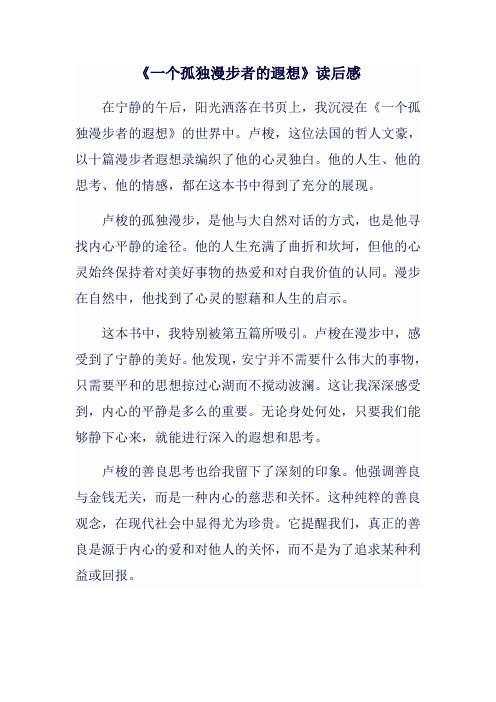
《一个孤独漫步者的遐想》读后感在宁静的午后,阳光洒落在书页上,我沉浸在《一个孤独漫步者的遐想》的世界中。
卢梭,这位法国的哲人文豪,以十篇漫步者遐想录编织了他的心灵独白。
他的人生、他的思考、他的情感,都在这本书中得到了充分的展现。
卢梭的孤独漫步,是他与大自然对话的方式,也是他寻找内心平静的途径。
他的人生充满了曲折和坎坷,但他的心灵始终保持着对美好事物的热爱和对自我价值的认同。
漫步在自然中,他找到了心灵的慰藉和人生的启示。
这本书中,我特别被第五篇所吸引。
卢梭在漫步中,感受到了宁静的美好。
他发现,安宁并不需要什么伟大的事物,只需要平和的思想掠过心湖而不搅动波澜。
这让我深深感受到,内心的平静是多么的重要。
无论身处何处,只要我们能够静下心来,就能进行深入的遐想和思考。
卢梭的善良思考也给我留下了深刻的印象。
他强调善良与金钱无关,而是一种内心的慈悲和关怀。
这种纯粹的善良观念,在现代社会中显得尤为珍贵。
它提醒我们,真正的善良是源于内心的爱和对他人的关怀,而不是为了追求某种利益或回报。
读完这本书,我深感震撼。
卢梭的人生和思考,都充满了智慧和洞见。
他的孤独漫步,不仅仅是对自然的探索,更是对人生的深入思考。
这本书让我明白,人生中的困境和孤独并不可怕,只要我们能够静下心来与自己对话,就能找到内心的平静和力量。
同时,我们也应该珍惜内心的善良和对他人的关怀,让这个世界变得更加美好。
总的来说,《一个孤独漫步者的遐想》是一本充满智慧和洞见的书。
它不仅仅是对自然的探索,更是对人生的深入思考。
它让我们明白,真正的幸福和满足,源于内心的平静和对美好事物的热爱。
无论身处何处,无论遭遇何种困境,只要我们能够保持内心的平静和善良,就能找到属于自己的幸福和满足。
作文:卢梭:一个孤独的散步者的遐想
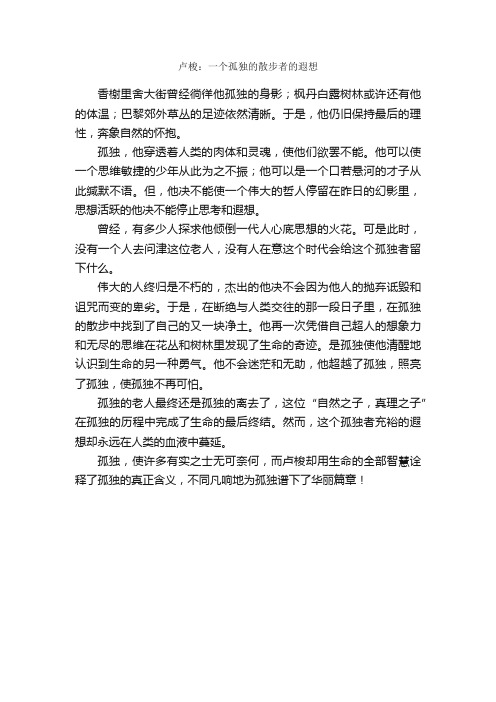
卢梭:一个孤独的散步者的遐想
香榭里舍大街曾经徜徉他孤独的身影;枫丹白露树林或许还有他的体温;巴黎郊外草丛的足迹依然清晰。
于是,他仍旧保持最后的理性,奔象自然的怀抱。
孤独,他穿透着人类的肉体和灵魂,使他们欲罢不能。
他可以使一个思维敏捷的少年从此为之不振;他可以是一个口若悬河的才子从此缄默不语。
但,他决不能使一个伟大的哲人停留在昨日的幻影里,思想活跃的他决不能停止思考和遐想。
曾经,有多少人探求他倾倒一代人心底思想的火花。
可是此时,没有一个人去问津这位老人,没有人在意这个时代会给这个孤独者留下什么。
伟大的人终归是不朽的,杰出的他决不会因为他人的抛弃诋毁和诅咒而变的卑劣。
于是,在断绝与人类交往的那一段日子里,在孤独的散步中找到了自己的又一块净土。
他再一次凭借自己超人的想象力和无尽的思维在花丛和树林里发现了生命的奇迹。
是孤独使他清醒地认识到生命的另一种勇气。
他不会迷茫和无助,他超越了孤独,照亮了孤独,使孤独不再可怕。
孤独的老人最终还是孤独的离去了,这位“自然之子,真理之子”在孤独的历程中完成了生命的最后终结。
然而,这个孤独者充裕的遐想却永远在人类的血液中蔓延。
孤独,使许多有实之士无可奈何,而卢梭却用生命的全部智慧诠释了孤独的真正含义,不同凡响地为孤独谱下了华丽篇章!。
崇尚自我的作品
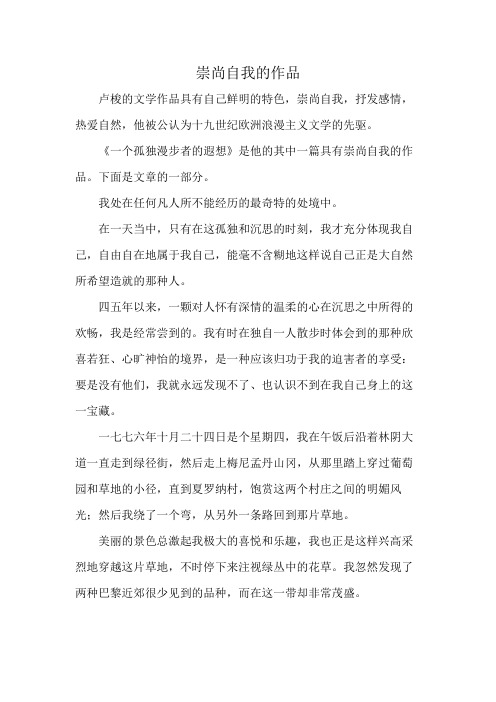
崇尚自我的作品卢梭的文学作品具有自己鲜明的特色,崇尚自我,抒发感情,热爱自然,他被公认为十九世纪欧洲浪漫主义文学的先驱。
《一个孤独漫步者的遐想》是他的其中一篇具有崇尚自我的作品。
下面是文章的一部分。
我处在任何凡人所不能经历的最奇特的处境中。
在一天当中,只有在这孤独和沉思的时刻,我才充分体现我自己,自由自在地属于我自己,能毫不含糊地这样说自己正是大自然所希望造就的那种人。
四五年以来,一颗对人怀有深情的温柔的心在沉思之中所得的欢畅,我是经常尝到的。
我有时在独自一人散步时体会到的那种欣喜若狂、心旷神怡的境界,是一种应该归功于我的迫害者的享受:要是没有他们,我就永远发现不了、也认识不到在我自己身上的这一宝藏。
一七七六年十月二十四日是个星期四,我在午饭后沿着林阴大道一直走到绿径街,然后走上梅尼孟丹山冈,从那里踏上穿过葡萄园和草地的小径,直到夏罗纳村,饱赏这两个村庄之间的明媚风光;然后我绕了一个弯,从另外一条路回到那片草地。
美丽的景色总激起我极大的喜悦和乐趣,我也正是这样兴高采烈地穿越这片草地,不时停下来注视绿丛中的花草。
我忽然发现了两种巴黎近郊很少见到的品种,而在这一带却非常茂盛。
一种是菊科的毛连菜,一种是伞形科的柴胡。
这一发现使我深感兴趣,欣喜若狂,结果又发现了一种更罕见的品种,特别是在地势较高的地方难得见到的品种:水生卷耳。
尽管当晚发生了事故,后来我还是在随身携带的一本书里找到了它,就把它收进我的标本集里。
此外那里还盛开着好几种花,虽然它们的外形和科目是我所熟悉的,然而我还是饶有兴趣地仔细看了一番,然后慢慢结束这局部的观察,开始品味这整个景色给我留下的同样愉快而且更加感人的印象。
葡萄的收摘已经结束好几天了;城里的游客已经回去;农民也正离开田地,要到冬季的农活开始时再回来。
田野依然一片翠绿,明媚宜人,但有些地方的树木已开始落叶,显得有点冷落,展现出一种荒凉和冬天临近的景象。
田野的景色给人既甘美又悲凉的印象,这跟我的年龄和命运太相似了,怎能使我不触景生情?我自己也正处在清白无辜而命途多舛的一生的晚年,胸中充满了强烈的感情,心上虽还有着几朵花儿作点缀,然而已被悲哀摧残得凋谢、被苦难折磨得枯萎了。
- 1、下载文档前请自行甄别文档内容的完整性,平台不提供额外的编辑、内容补充、找答案等附加服务。
- 2、"仅部分预览"的文档,不可在线预览部分如存在完整性等问题,可反馈申请退款(可完整预览的文档不适用该条件!)。
- 3、如文档侵犯您的权益,请联系客服反馈,我们会尽快为您处理(人工客服工作时间:9:00-18:30)。
Third Walk(Abridged)Jean-Jacques RousseauGrowing older, I learn all the time.Solon often repeated this line in his old age. In a sense I could say the same, but the knowledge that the experience of twenty years has brought me is a poor thing, and even ignorance would be preferable. No doubt adversity is a great teacher, but its lessons are dearly bought, and often the profit we gain from them is not worth the price they cost us. What is more, these lessons come so late in the day that by the time we master them they are of no use to us. Youth is the time to study wisdom, age the time to practice it. Experience is always instructive, I admit, but it is only useful in the time we have left to live. When death is already at the door, is it worth learning how we should have lived?What use to me are the insights I have gained so late and so painfully into my destiny and the passions of those who have made it what it is? If I have learned to know men better, it is only to feel more keenly the misery into which they have plunged me, nor has this knowledge, while laying bare all their traps, enabled me to avoid a single one. Why did I not remain in that foolish yet blessed faith, which made me for so many years the prey and plaything of my vociferous friends with never the least suspicion of all the plots enveloping me? I was their dupe and their victim, to be sure, but I believed they love me, my heart enjoyed the friendship they had inspired in me, and I credited them with the same feelings. Those sweet illusions have been destroyed. The sad truth that time and reason have revealed to me in making me aware of my misfortune, has convinced me that there is no remedy and that resignation is my only course. Thus all the experience of my old age is of no use to me in my present state, nor will it help me in the future.We enter the race when we are born and we leave it when we die. Why learn to drive your chariot better when you are close to the finishing post? All you have to consider then is how to make your exit. If an old man has something to learn, it is the art of dying, and this is precisely what occupies people at least my age; we think of anything rather than that. Old men are all more attracted to life than children, and they leave it with a worse grace than the young. This is because all their labours have had this life in view, and at the end they see that it has all been in vain. When they go, they leave everything behind, all their concerns, all their goods, and the fruits of all their tireless endeavours. They have not thought to acquire anything during their lives that they could take with them when they die.I told myself all this when there was still time, and if I have not been able to make better use of my reflections, this is not because they came too late or remained undigested. Thrown into the whirlpool of life while still a child, I learned from early experience that I was not made for this world, and that in it I would never attain the state to which my heart aspired. Ceasing therefore to seek among men the happiness which I felt I could never find there, my ardent imagination learned to leap over the boundaries of life which was as yet hardly begun, as if it were flying over an alien land in search of a fixed and stable resting place.This desire, fostered by my early education and later strengthened by the long train of miseries and misfortunes that have filled my life, has at all times led me to seek after the nature and purpose of my being with greater interest and determination than I have seen in anyone else. I have met many men who were more learned in their philosophizing, but their philosophy remained as it were external to them. Wishing to know more than other people, they studied the working of the universe, as they might have studied some machine they had come across, out of sheer curiosity. They studied human nature in order to speak knowledgeably about it, not in order to know themselves; their efforts were directed to the instruction of others and not to their own inner enlightenment. Several of them merely wanted to write a book, any book, so long as it was successful. Once it was written and published, its contents no longer interested them in the least. All they wanted was to have it accepted by other people and to defend it when it was attacked; beyond this they neither took anything from it fortheir own use nor concerned themselves with its truth or falsehood, provided it escaped refutation. For my part, when I have set out to learn something, my aim has been to gain knowledge for myself and not to be a teacher; I have always thought that before instructing others one should begin by knowing enough for one’s own needs, and of all the studies I have undertaken in my life among men, there is hardly one that I would not equally have undertaken if I had been confined to a desert island for the rest of my days. What we ought to do depends largely on what we ought to believe, and in all matters other than the basic needs of our nature our opinions govern our actions. This principle, to which I have always adhered, has frequently led me to seek at length for the true purpose of my life so as to be able to determine its conduct, and feeling that this purpose was not to be found among men, I soon became reconciled to my incapacity for worldly success.Born into a moral and pious family and brought up affectionately by a minister full of virtue and religion, I had received from my earliest years principles and maxims – prejudices, some might say – which have never entirely deserted me. While I was still a child, left to my own devices, led on by my kindness, seduced by vanity, duped by hope and compelled by necessity, I became a Catholic, but I remained a Christian and soon my heart, under the influence of habit, became sincerely attached to my new religion. The instruction and good example I received from Madame de Warens confirmed me in this attachment. The rural solitude in which I spent the best days of my youth, and reading of good books which completely absorbed me, strengthened my naturally affectionate tendencies in her company and led me to an almost Fenelon-like devotion, lonely meditation, the study of nature and the contemplation of the universe lead the solitary to aspire continually to the maker of all things and to seek with a pleasing disquiet for the purpose of all he sees and the cause of all he feels. When my destiny cast me back into the torrent of this world, I found nothing there which could satisfy my heart for a single moment. Regret for the sweet liberty I had lost followed me everywhere and threw a veil of indifference or distaste over everything around me which might have brought me fame and fortune. Wavering in my uncertain desires, I hoped for little and obtained less, and even amidst the gleams of prosperity that came myway I felt that had I obtained all I thought I wanted, it would not have given me the happiness that my heart thirsted after without knowing clearly what it was. In this way everything conspired to detach my affection from this world, even before the onset of those misfortunes which were to make me a total stranger to it. I reached the age of forty, oscillating between poverty and riches, wisdom and error, full of vices born of habit, but with a heart free of evil inclinations, living at random with no rational principles, and careless but not scornful of my duties, of which I was often not fully aware.Since the days of my youth I had fixed on the age of forty as the end of my efforts to succeed, the final term of my various ambitions. I had the firm intention, when I reached this age, of making no further effort to climb out of whatever situation I was in and of spending the rest of my life living from day to day with no thought for the future. When the time came I carried out my plan without difficulty, and although my fortune at that time seemed to be on the point of changing permanently for the better, it was not only without regret but with real pleasure that I gave up these prospects. In shaking off all these lures and vain hopes, I abandoned myself entirely to the non-chalant tranquility which has always been my dominant taste and most lasting inclination. I quitted the world and its vanities, I gave up all finery – no more sword, no more watch, no more white stockings, gilt trimmings and powder, but a simple wig and a good solid coat of broadcloth – and what is more than all the rest, I uprooted from my heart the greed and covetousness which give value to all I was leaving behind. I gave up the position I was then occupying, a position for which I was quite unsuited, and set myself to copying music at so much a page, an occupation for which I had always had a distinct liking.1,634 wordsGlossarydupe finery。
